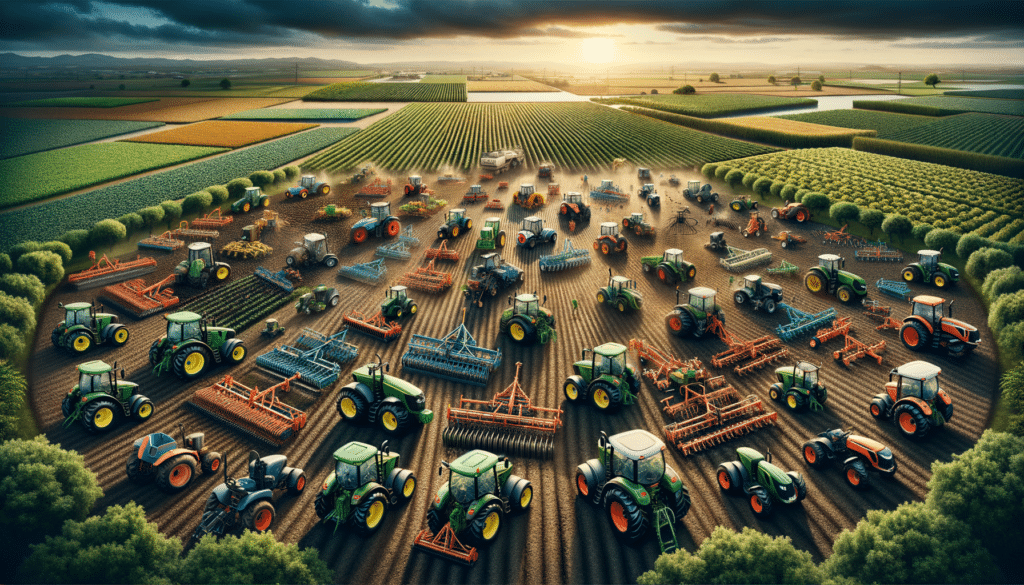The Role of Small Tractors in Modern Agriculture
In the realm of modern agriculture, small farms are increasingly relying on small tractors to enhance productivity and efficiency. These versatile machines are designed to meet the unique needs of smaller plots of land, where larger tractors may be impractical. Small tractors offer a range of functionalities that make them indispensable for various farming tasks, from plowing and tilling to transporting goods and maintaining the farm’s infrastructure. Their compact size allows them to navigate tight spaces and work on smaller plots without causing damage to the crops or soil.
Small tractors are also more affordable and cost-effective compared to their larger counterparts, making them an attractive option for farmers with limited budgets. They require less fuel and are easier to maintain, which further reduces operational costs. Additionally, many small tractors come with a variety of attachments and implements that can be easily swapped out to perform different tasks, increasing their versatility and utility on the farm.
Moreover, the use of small tractors contributes to sustainable farming practices. Their smaller size and lighter weight reduce soil compaction, which helps maintain soil health and fertility. This is particularly important for small farms that rely on organic farming methods and aim to preserve the integrity of their land. By investing in a small tractor, farmers can improve their operational efficiency while also supporting environmentally friendly practices.
Choosing the Right Small Tractor
Selecting the right small tractor for a farm involves considering several factors to ensure it meets the specific needs of the operation. The first consideration is the size of the farm and the type of tasks that the tractor will be used for. For instance, a farm that primarily grows vegetables may require a tractor with different capabilities than one that raises livestock or grows grains.
Farmers should also consider the terrain and soil conditions of their land. Tractors with four-wheel drive capabilities are ideal for farms with hilly or uneven terrain, as they provide better traction and stability. Additionally, the power and horsepower of the tractor should match the demands of the farm tasks. A tractor with too little power may struggle with heavy-duty tasks, while one with too much power may be unnecessarily costly.
Another important factor is the availability of attachments and implements. Farmers should look for tractors that are compatible with a wide range of tools, such as plows, harrows, seeders, and loaders. This compatibility ensures that the tractor can be used for multiple purposes, maximizing its utility and value.
Finally, farmers should consider the brand reputation and customer reviews of the tractor models they are interested in. This can provide insights into the reliability and durability of the tractors, helping farmers make informed decisions. By carefully evaluating these factors, farmers can choose a small tractor that aligns with their operational needs and budget.
Technological Advancements in Small Tractors
The agricultural industry has seen significant technological advancements, and small tractors are no exception. Modern small tractors are equipped with innovative features that enhance their performance and efficiency. One such advancement is the integration of precision farming technology, which allows farmers to optimize their farming practices through data-driven insights.
Precision farming technology includes GPS guidance systems, which enable tractors to navigate fields with high accuracy, reducing overlaps and gaps during planting or harvesting. This technology not only improves efficiency but also minimizes waste, leading to cost savings and increased yields.
Another technological advancement is the incorporation of telematics systems in small tractors. These systems provide real-time data on tractor performance, fuel consumption, and maintenance needs, allowing farmers to monitor and manage their equipment more effectively. By using telematics, farmers can schedule maintenance proactively, reducing downtime and extending the lifespan of their tractors.
Furthermore, some small tractors are now equipped with automated steering and control systems, which reduce the need for manual intervention and improve precision. These systems can be particularly beneficial for farmers with limited labor resources, as they allow for more efficient use of time and manpower.
As technology continues to evolve, small tractors are becoming increasingly sophisticated, offering farmers new ways to enhance their productivity and sustainability. By embracing these technological advancements, farmers can stay competitive and meet the growing demands of modern agriculture.
Environmental Benefits of Small Tractors
Small tractors offer several environmental benefits that make them an attractive choice for eco-conscious farmers. One of the primary advantages is their reduced carbon footprint compared to larger tractors. Small tractors consume less fuel, resulting in lower greenhouse gas emissions and contributing to a more sustainable farming operation.
Their compact size and lightweight design also minimize soil compaction, which is crucial for maintaining soil health. Soil compaction can lead to reduced water infiltration, poor root growth, and decreased yields. By using small tractors, farmers can preserve soil structure and fertility, supporting long-term agricultural productivity.
Additionally, small tractors can be used in conjunction with sustainable farming practices such as cover cropping and reduced tillage. These practices help improve soil health, reduce erosion, and enhance biodiversity on the farm. Small tractors are well-suited for these tasks, as their maneuverability allows them to work efficiently in diverse farming systems.
Furthermore, some manufacturers are developing electric and hybrid small tractors, which offer even greater environmental benefits. These tractors produce zero emissions during operation, making them an ideal choice for farms aiming to reduce their environmental impact. While still in the early stages of development, electric and hybrid small tractors represent a promising step towards more sustainable agriculture.
By incorporating small tractors into their operations, farmers can enjoy the benefits of increased efficiency and productivity while also supporting environmentally friendly practices. This balance between productivity and sustainability is essential for the future of agriculture.
Cost Considerations and Financial Benefits
Investing in a small tractor can be a significant financial decision for small farm owners, but it also offers numerous cost benefits that can outweigh the initial expense. One of the main advantages is the reduced operational costs associated with small tractors. They are generally more fuel-efficient than larger tractors, leading to lower fuel expenses over time.
Moreover, small tractors often require less maintenance, as their simpler design and smaller engines are easier to service. This can result in lower maintenance costs and fewer repairs, saving farmers money in the long run. Additionally, the availability of interchangeable attachments allows farmers to perform a wide range of tasks with a single tractor, eliminating the need to invest in multiple pieces of equipment.
Small tractors can also enhance farm productivity, leading to increased yields and revenue. By enabling more efficient land preparation, planting, and harvesting, small tractors help farmers optimize their operations and maximize their output. This increased productivity can translate into higher profits, providing a return on investment for the tractor purchase.
Furthermore, small tractors can qualify for various government incentives and grants aimed at supporting sustainable agriculture and small-scale farming. These financial programs can help offset the initial cost of purchasing a small tractor, making it a more affordable option for farmers.
Overall, while the upfront cost of a small tractor may be a consideration, the long-term financial benefits and increased efficiency make it a worthwhile investment for small farm owners. By carefully evaluating their needs and budget, farmers can choose a small tractor that provides both economic and operational advantages.





